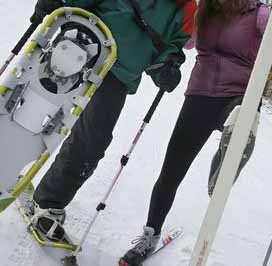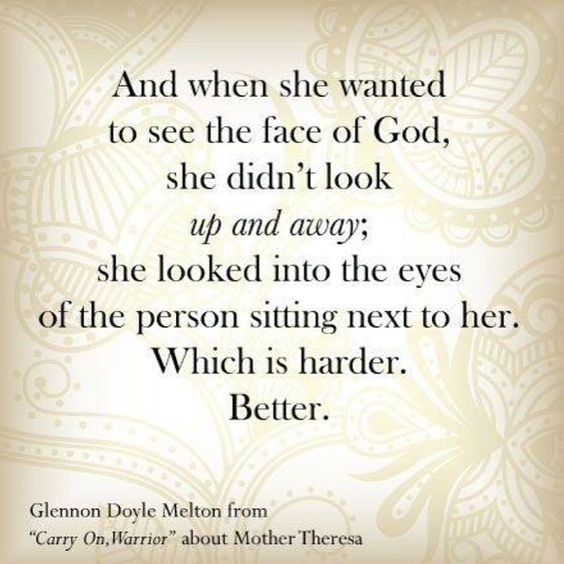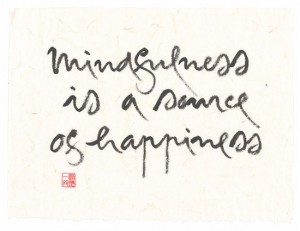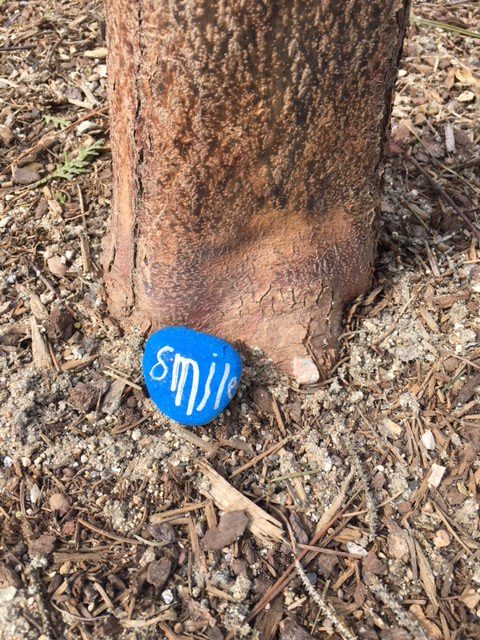Sat, Mar 5: OPEN BODY
My steps have held fast to your paths;
my feet have not slipped. — Psalm 17:5
In this season, we renew our walk along the Way. We journey through the world with our human bodies. Though we also nurture healthy thoughts and emotions, it is our body that communicates the incarnate journey to our mind and heart. Our bodies are wired, by nerves attached to receptor cells, to transmit signals that conduct information to our brain. In this way, our body teaches and guides us.
We know that throughout life, our bodies change. That the signals alter. We may have challenged eyesight or difficult hearing. Even how our bodies move may change. At different ages, we may move confidently and quickly or more intentionally and carefully. Our bodies change, and so does our experience of the world.
What does the world say to you, when you pay attention as you move through it? Do you pause and listen, hearing bird song or river rush or traffic rumble? Do you look up and around and notice new things, such as the sunlight falling through the branches, or the satellite passing through the starry night sky, or the roll of clouds over the peaks? Do you walk steady on your feet, because the earth is bare and safe, or step gingerly, striving for balance after thaw-and-freeze cycles that lay down treacherous ice? Do you sometimes tiptoe or dance, instead of walking? Do you walk backwards or whirl in a circle? Do you change the way you move in the world, surprising yourself and others as you do? Do you, if you’re able, lay down on the ground and look up at the sky?
Are you able to move independently through the world, or do you use assistance, from a hiking pole or cane to a walker or chair? How does this different way of moving alter your perception? How does it change the way others perceive the world, because they know you and care about your experience?
What do you say to the physical world, by how you are present as you live within its environs? Do you put on skis, snowshoes, spikes, or boots, and immerse yourself in the elements? Do you pick up litter or clear the trail when you’re out walking, hiking, skiing, or snowshoeing, to make it better for the next traveler? If you’re driving, do you minimize errands or bring along a friend to conserve fuel and steward energy and resources? Do you take a detour to visit a new neighborhood or appreciate and explore a different scene? Do you shovel or plow snow for your neighbor as well as yourself, to reinforce communal care and connections? Or does someone do these things for you?
Let us consider how we move through the world. Thich Nhat Hanh, the Vietnamese monk who developed the practice of engaged Buddhism, often taught, “When we walk like (we are rushing), we print anxiety and sorrow on the earth. We have to walk in a way that we only print peace and serenity on the earth… Be aware of the contact between your feet and the earth. Walk as if you are kissing the earth with your feet.” In other words, create a tender relationship between yourself and the environment.— Rev Gail
————————————————————————————
Sometimes I need
only to stand
wherever I am
to be blessed.
― Mary Oliver
PRAYER for WALKING
— Thich Nhat Hanh Walk and touch peace every moment.
Walk and touch happiness every moment.
Each step brings a fresh breeze.
Each step makes a flower bloom.
Kiss the Earth with your feet.
Bring the Earth your love and happiness.
The Earth will be safe
Lenten Devotional – THURS, Mar 18: SEE (revisited)
Who has seen Godself? How do we see God? Do we see Godself in human form, as described here, or as something else?
In scripture, few people could come directly into the presence of Godself. The great prophet Moses did so. Others could not look upon the radiance of his face afterward. A few other Biblical prophets also reported meeting God in person.
Famously, in Hebrew Scriptures, Jacob wrestled with a stranger at night on his way to Canaan. Though dawn was approaching, neither person could prevail. Jacob refused to give up the struggle, so the stranger touched his hip, and hi joint came out of place. Afterward Jacob limped. By remaining stubbi=orn and continuing to wrestle, he won for himself a blessing and the new name Israel. Jacob named the place by the river where he had wrestled with Godself Peniel or Penuel. (פְּנוּאֵל) Trabnslated, this means “face of God” or “facing God”.
Later, in a tender passage, Jacob then says to his brother Esau, “For I have, after all, seen your face, as one sees the face of God…” He sees Godself in his sibling’s face. It is a fleeting experience. The connection doesn’t endure, perhaps because humans cannot sustain such awareness in each other’s company. Theologian Steve Watson writes, “He has just had this profound spiritual experience – he knows a thing or two about seeing the face of God. And he looks at his brother, face to face, and thinks that is what is happening. To see you accepting me, for us to be at peace – without walls, without fear, person to person, is for me to see in your face the face of God. … this proves to be too much. The intimacy of full personhood, brother to brother, is somehow so unfamiliar, so threatening, that within a day, he’s moved on… But for a moment, he had that connection, that peace to see the face of God in his brother.”
Yet for a brief time, they both experienced a profound sense of once more being in God’s company. They found God in each other.
Of course, the followers of Jesus walked in the embodied presence of the child of God. Most Christians recognize him as part of the holy trinity: Godself.
Jesus also, powerfully, reminded people that when they attended to the needs of others, they attended to the needs of God. They met Jesus in the form of other people to whome they offered compassion. How often, then, might you have been meeting the needs of Godself, even sat or kept vigil in the presence of Godself, by responding to human needs?
In our times, how do we see Godself in the world around us?
Has any person ever brought you into the presence of God? Perhaps at thesholds, such as birth or death, or life moments such as making promises to each other?
Or have you, like Moses, find Godself out in nature? On top of a mountain? Inside the the branches of a bush? At the ocean’s edge? In a quiet woodland? A spring meadow? A winter storm? A summer rainfall? In the midst of birdsong? Surrounded by wild creatures? In the presence of your own pet?
Remember that Godself saw your face first. And loved you, even if you didn’t recognize Godself. — Rev Gail
MEDITATIONS
Trust and value your own divinity as well as your connection to nature. Seeing God’s work everywhere will be your reward. — Wayne Dyer
Love is seeing God in the person next to us, and meditation is seeing God within us. Votes: — Sri Sri Ravi Shankar
Never lose an opportunity of seeing anything beautiful, for beauty is God’s handwriting. — Ralph Waldo Emerson
Seeing God face to face is to feel that He is enthroned in our hearts even as a child feels a mother’s affection without needing any demonstration. — Mahatma Gandhi
Challenge or Question: Where do you experience God’s self-revelation in the world?
Advent Daily Devotional, Day 9
Mon, Dec 7 – DAY 9
Peace grows out of contemplative practices. Set apart time for stillness, centering, or movement as a form of meditation or focus.
Sometimes this requires becoming motionless: holding a yoga pose, maintaining a prayer position, or observing utter silence. Sometimes it involves movement of the body such as walking or knitting, and permission to unleash a restless mind through journaling or creative expression. One way or another, we are urged to set apart time and nurture the inner spiritual being.
Along the way, we aim to develop internal equilibrium. Become comfortable knowing ourselves more deeply. Gain insight. Renew energy and creativity.
Altogether, contemplative practices strengthen the spiritual muscles upon which we draw. They create resilience and balance in our bodies, hearts and minds. — Rev Gail
The effect of righteousness will be peace, and the result of righteousness, quietness and trust forever. — Isaiah 32:17
Peace I leave with you; my peace I give to you. I do not give to you as the world gives. Do not let your hearts be troubled, and do not let them be afraid. — John 14:27
Never be in a hurry; do everything quietly and in a calm spirit. Do not lose your inner peace for anything whatsoever, even if your whole world seems upset. — Saint Francis de Sales
No person, no place, and no thing has any power over us, for ‘we’ are the only thinkers in our mind. When we create peace and harmony and balance in our minds, we will find it in our lives. —Louise Hay
Tue, Nov 17 Gratitude Reflection
Pause and focus on water. Give thanks for this element that sustains life. In fresh form, untainted by toxins, it becomes a potable promise of surviving and thriving.
Jesus’ first miracle transformed water into wine. He called himself the Living Water for the woman at the well, who offered him refreshment, though she was from a despised ethnicity that he would traditionally have shunned.
In times of drought, such as we have experienced this season, wells run dry. Water collects detritus. Riverbeds become barren. Thirst parches throats, simply due to the idea of running out. Of not having enough.
Give thanks for the abundance of water when it’s available. And for its precious presence, when it is scarce. — Rev Gail
You visit the earth and water it, you greatly enrich it;
the river of God is full of water;
you provide the people with grain,
for so you have prepared it.
You water its furrows abundantly, settling its ridges,
softening it with showers, and blessing its growth.
You crown the year with your bounty;
your wagon tracks overflow with richness.
The pastures of the wilderness overflow,
the hills gird themselves with joy,
the meadows clothe themselves with flocks,
the valleys deck themselves with grain,
they shout and sing together for joy.
- Psalm 65
The Dead Sea in the Middle East receives fresh water, but it has no outlet, so it doesn’t pass the water out. It receives beautiful water from the rivers, and the water goes dank. I mean, it just goes bad. And that’s why it is the Dead Sea. It receives and does not give. In the end generosity is the best way of becoming more, more, and more joyful. ― Desmond Tutu
Mon, Nov 16 Gratitude Reflection
Consider the earth. Give thanks for the ground beneath your feet. The glacier-driven cliffs and outcroppings, twisted into waterfalls and ledges, that shape our landscape. Imagine the rich soil that yields summer and autumn harvests. The fierce and ancient mountains, upthrust and worn low, that frame our valley.
Stone. Soil. Rock. Dirt. May we appreciate the holy ground on which we stand, reside, play, work and learn. May we pause to recognize that she is more than mere rock, but an interconnected part of creation. She holds us up. Gives us a home. Groans, and continues to live. — Rev Gail
… you are the hope of all the ends of the earth
and of the farthest seas.
By your strength you established the mountains;
you are girded with might.
You silence the roaring of the seas,
the roaring of their waves,
the tumult of the peoples.
— Psalm 65
Fill the earth with your songs of gratitude.
— Charles Spurgeon
There are three requisites to the proper enjoyment of earthly blessings: a thankful reflection, on the goodness of the giver; a deep sense of our own unworthiness; and a recollection of the uncertainty of our long possessing them. The first will make us grateful; the second, humble; and the third, moderate. – Hannah More



